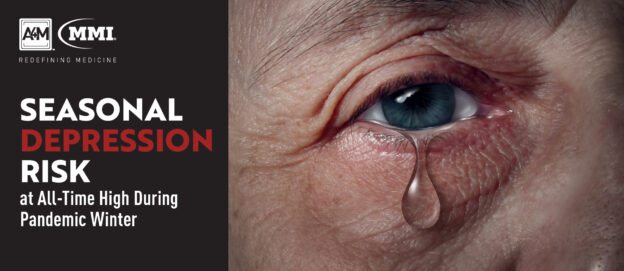As many studies have already reported, rates of mental illness symptoms in the population have been rising throughout 2020 due to social distancing measures, increased isolation, and a general upheaval of normal life due to the COVID-19 pandemic. For this reason, the prevalence of seasonal affective disorder (SAD) is also projected to reach an all-time high in the forthcoming months as surges in virus cases coincide with declining options for activities as colder weather encroaches. Alongside the widespread, multi-faceted devastation caused by the pandemic, political concerns and social unrest leave the American population increasingly vulnerable to SAD this fall/winter season.
Seasonal Affective Disorder
According to current estimates, approximately 5% of Americans experience seasonal depression which usually begins during transitions from the summer to fall and fall to winter.
The onset of colder weather and decreased sunlight exposure contribute to a biochemical imbalance in the brain characterized by lowered serotonin levels and altered circadian rhythms. Common symptoms include sadness, loss of interest in activities, changes in appetite or eating patterns, changes in sleep, and loss of energy. The condition typically lasts for approximately 40% of the year although, in some patients it can last even longer.
Seasonal affective disorder is more common among women, young adults, those living further from the equator, as well as those with a personal or family history of depression. Nonetheless, the current environment is not conducive to overall wellbeing, putting more individuals at risk for depression even if they have never experienced mental health concerns before.
SAD Amid COVID-19 Restrictions
The symptoms of seasonal depression are likely to be exacerbated by pandemic conditions across the world as the number of activities decreases and feelings of isolation, compounded by stress and anxiety, increase across populations and age groups. Protective measures against COVID-19, including the closure of many business and limited social contact, contribute not only to declining in-person interactions but also growing financial burden. The lack of physical mobility, reduction in activities, and persisting threat of the novel coronavirus greatly heighten the risk for mental health symptoms in the population.
“There’s less activity, there’s less socialization, there are less mastery activities, there are less pleasurable activities, so in general there is an increase in depression, not to mention job losses and losses of people,” Dr. Lata McGinn, co-founder of Cognitive and Behavioral Consultants told USA Today in a recent article.
Therapeutic Options
It is paramount to find safe ways to socialize and remain active throughout the coming fall/winter season. Individuals are encouraged to maintain a strong support system of family and friends with frequent video and phone calls, socially-distanced visits, and other safe interactions. Experts recommend keeping a consistent exercise routine, which can greatly benefit mental health while also increasing overall emotional and physical wellbeing. Despite the cold, it is important to continue spending time outdoors for sunlight and fresh air exposure in a safe way.
Another potential therapeutic option recommended by psychologists is light therapy, which can be used indoors to mimic sunlight exposure. Daily treatment involves approximately 20 minutes of exposure to the light throughout the winter months with improvements seen between 1-2 weeks after initiating treatment.
In addition, experts recommend pursuing an “activity diet” focused on learning and building new skills – such as studying a new language – in order to derive a sense of accomplishment. CNN outlines several other helpful options and ideas for combating seasonal depression symptoms during this time, including journaling and other meditative practices.
However, some patients may need to undertake more aggressive treatment measures to improve their seasonal depression symptoms. Talk therapy and cognitive behavioral therapy can effectively treat SAD as can antidepressant medications, such as selective serotonin reuptake inhibitors (SSRIs). With the rise of telemedicine, there has also been an increase in available options for virtual psychologist and psychiatrist visits bringing mental health support to patients in the comfort of their own home.
Although the National Institute of Health does not recommend diagnosing seasonal affective disorder until symptoms are experienced for two or more consecutive years, if symptoms begin to negatively affect daily functioning individuals are urged to seek professional support. As per the American Psychiatric Association, “anyone feeling severe symptoms of depression or suicidal thoughts to contact a doctor immediately or seek help at the closest emergency room. The National Suicide Prevention Lifeline can be reached at 800-273-TALK (8255) or via online chat.“


